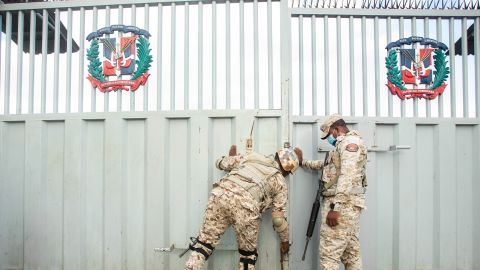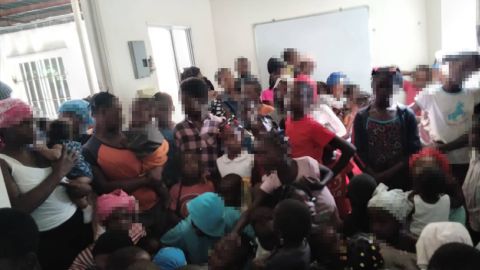

“One woman had a diaper bag with her, but not the baby. [Immigration agents] had told her that she couldn’t carry her baby with her, and that they would bring it to the bus – but then they didn’t bring the baby to the bus,” said Yoana Kuzmova, a researcher at Dominican migration policy thinktank Center for Migratory Observation and Social Development in the Caribbean.
Allegations of ‘degrading treatment’ and mistaken identities
“I was sleeping in my house with my family. At 3 a.m. (local time), a group of immigration officers broke down my door and arrested me. They did not ask me for my papers or anything; they did not let me speak,” says one man of Haitian origin, whose legal work permit was in the process of being renewed when he was arrested.“They just grabbed me and took me away; I told them I had papers and they did not even listen,” he added.
He was detained overnight in squalid conditions before being released the next day.
“They treat them like animals. Once they put them in jail, they leave them there to sleep on the floor without feeding them. They destroyed people’s documents and in some cases, people had no chance to show their papers,” said Sam Guillaume, a GARR spokesperson.
The Dominican Republic’s effort to remove people of Haitian origin from the country goes back years.
In 2013, the country’s constitutional court controversially ruled that Dominicans born in the country to undocumented parents should be stripped of their citizenship – rendering tens of thousands of people stateless, with no other country to call home.
Known colloquially as “La Sentencia” or the Sentence, it “created a situation of statelessness of a magnitude never before seen in the Americas,” according to the Inter-American Commission on Human Rights.
Many Haitian migrants in the Dominican Republic rely on short-term residency permits to remain in the country legally through a “regularization plan.” But Kuzmova, the legal researcher, says she hears “over and over” that they risk being deported while they wait to renew those permits.
“When it comes to Haitian migrants, the residence permit is valid for a year, and they take a year to renew it. So the reality is that if this person who is eligible for a permit gets picked up on the street, they’re not going to have a valid document on them,” she says.
“What people are saying is that when you get picked up with an expired card, they destroy it. And that was basically the proof that you had of being in the regularization plan.”
A new presidential decree, issued last week to create a specialized law enforcement unit to combat squatting, could also be used to target people of Haitian origin living on historic sugar plantation villages known as bateyes, which once drew large numbers of migrant workers.
“The people living there now are largely retired old people who worked on the plantations, and they don’t have proof of title. So that could be another way to instrumentalize police to enforce deportations,” Kuzmova says.
As Haiti struggles to recover from interlinked political and security crises, the UN has repeatedly called on the Dominican Republic to stop sending people there.
“Unremitting armed violence and systematic human rights violations in Haiti do not currently allow for the safe, dignified and sustainable return of Haitians to the country. I reiterate my call to all countries in the region, including the Dominican Republic, to halt the deportation of Haitians,” said UN High Commissioner for Human Rights Volker Türk earlier this month.
Two days later, Dominican Republic President Luis Abinader responded with derision, describing Turk’s statement as “unacceptable and irresponsible” – and saying he would instead accelerate deportations.






No comments:
Post a Comment